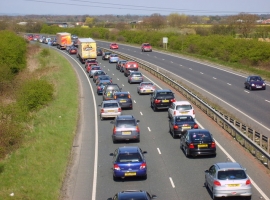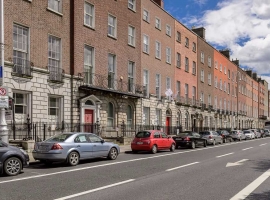Warrenpoint, a Northern Irish town of around 8,000 inhabitants, has always viewed itself through the lens of its proximity to the Republic of Ireland. As the crow flies, or more aptly, as the fish swims, it’s under 1 mile away from the village of Omeath, Co Louth. That’s from the tip of Warrenpoint’s pier, which stretches out on to Carlingford Lough towards Omeath on the other side.
Of course, in reality Warrenpoint is miles away from Omeath, about 13 miles on the road by car. The road loops through Newry, then down hugging the River Clanrye which spills out into Carlingford Lough again. About 25 minutes depending on traffic, worth a trip during those periods in the 1990s when the difference between petrol and cigarette prices were starker. Perhaps not so much today.
Because of their location, people from Omeath and Warrenpoint are always going to have a keen interest in the Brexit impact on trading, but they are, of course, not alone. The carparks of Newry’s retailers are packed with cars from the Republic of Ireland, ‘Southerners’ coming to do their shopping has been the lifeblood of a roaring local economy since the introduction of the Euro.
Lost opportunity for border towns
Yet, while media has focused on the negative impact of Brexit on border areas, politicians failed to build a narrative on the opportunities that could have been grasped by Northern Ireland in the event of the UK leaving the EU.
The rhetoric coming from the DUP – and make no mistake, the DUP has been the only political party shaping the narrative, despite the North being a ‘remain region’ – can be distilled down to a simple phrase “we don’t want any special treatment”. Overlooking the political sensitivity for a moment, it’s nothing short of myopic from a business standpoint.
But consider what would happen if Northern Ireland did get special treatment, becoming a region with one foot in the UK and the other in the EU? Most businesses agree that a Brexit of any kind is not good for the island of Ireland, but one could argue that an economically dynamic Northern Ireland with ties to both camps would be a boon for towns and villages on both sides of the border.
Unfortunately, any calls for this kind of radical solution were drowned out by the political dialogue over Northern Ireland’s past. The Troubles, of course, should not be merely dismissed as something in the past, and the spectre of that time understandably should be taken into consideration when making any political decision, even if it is economically detrimental.
Lack of political will to shape Brexit
However, it was the absence of dialogue over Northern Ireland’s potential role after Brexit that is worrying. Where were the politicians who accepted Brexit as a reality, but saw a middle road as an opportunity for the region? Where were the business leaders who wanted to seize that chance? Today, the border – or lack of it – is the line between the UK and just under 5 million people. Tomorrow, it could be a line between the UK and over 500 million people across 27 countries. There has simply not been enough political bravery to capitalise on the latter.
If we accept Brexit as a reality, and, yes, many of us are hoping that it never comes to pass, then it would be fruitful to concentrate on making a success of it, not just warning of its dangers. It is possible for business to both resits and plan, but political will needs to be there too.
Yet, that political myopia has been in Northern Ireland for a long time. In Warrenpoint and Omeath, there have been plans for years to build a bridge across the narrowest point of the water. The project was greenlighted for funds by the EU (of course) a couple of years ago, but torpedoed by politicians, much to the chagrin of the communities on both sides of Carlingford Lough. A symbol for our times, perhaps.

















